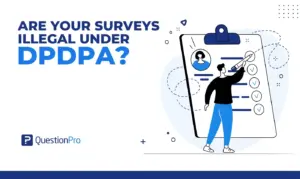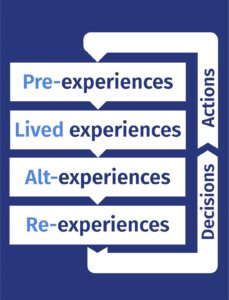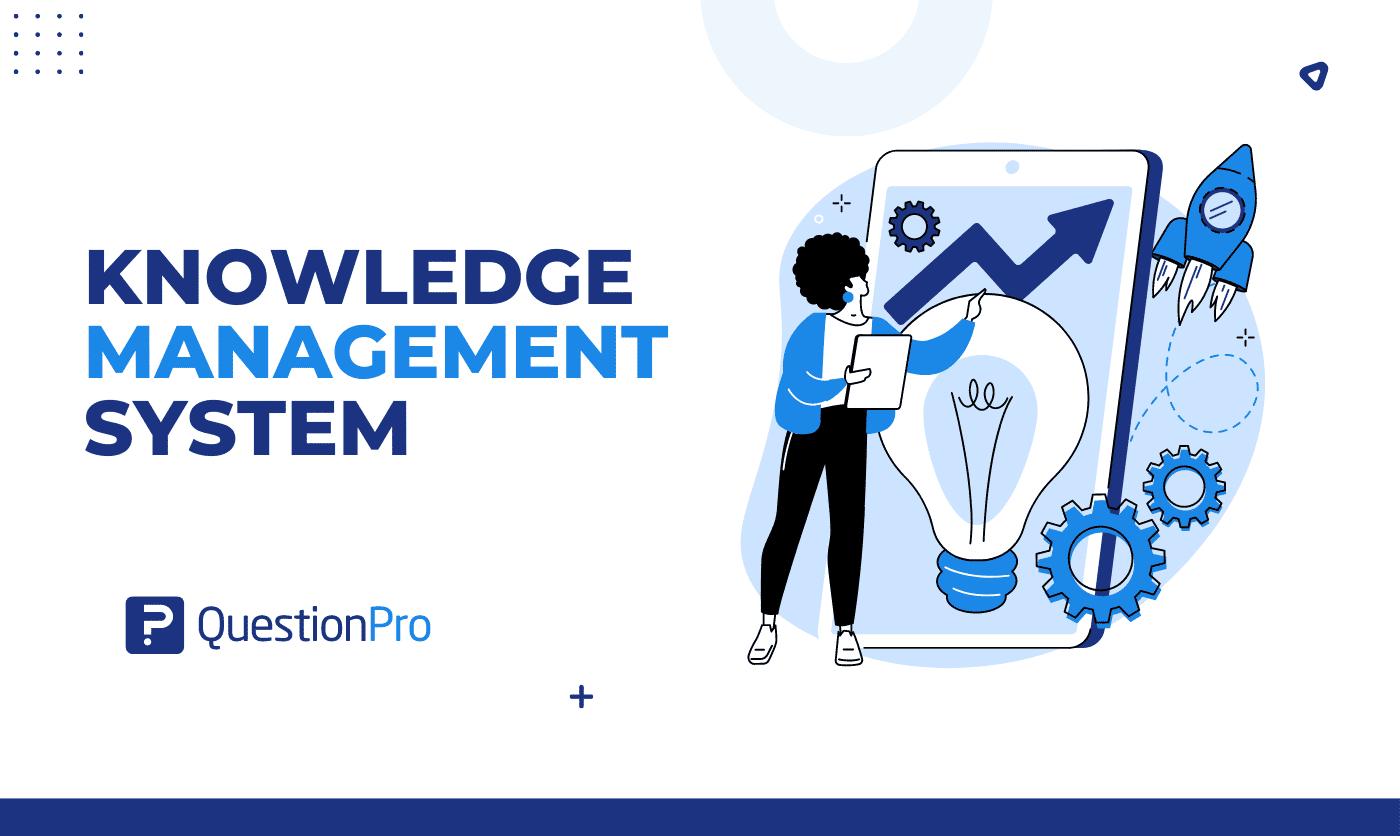
Businesses are always looking for ways to work smarter and faster and stay ahead of the game. Isn’t it great if every time you needed important information at work, it was just a click away? No more endless searches through emails and files or asking around for answers. Sounds great, right? That’s exactly what a Knowledge Management System (KMS) can do for you and your organization.
A Knowledge Management System (KMS) can help solve many of the challenges that businesses and organizations face related to information handling, communication, and productivity. In this blog, we will explore what a KMS is, how it can benefit you, and the different types available to meet your needs.
What is a Knowledge Management System?
A Knowledge Management System (KMS) helps organizations gather, store, and share information and knowledge. It acts as a central hub where all the valuable insights, data, documents, and expertise within a company are collected and made easily accessible to employees.
The primary goal of a KMS is to ensure that valuable information is readily available to those who need it, creating a culture of continuous learning and improvement within the organization. This helps improve decision-making, enhances productivity, and ensures that knowledge isn’t lost when employees leave the company.
A KMS has numerous advantages for a business, including:
- External: potential customers, clients, users, and other parties involved.
- Internal: knowledge managers, content producers, customer service agents, and other teams within your company.
However, a specific computer folder may be enough. A KMS does more than just store information and distribute it to the appropriate parties.
Knowledge Management System Examples
Knowledge Management Systems (KMS) encompass a range of tools and platforms designed to facilitate knowledge creation. Here are some examples, with QuestionPro InsightHub highlighted as a focus knowledge management software:
01. QuestionPro InsightHub
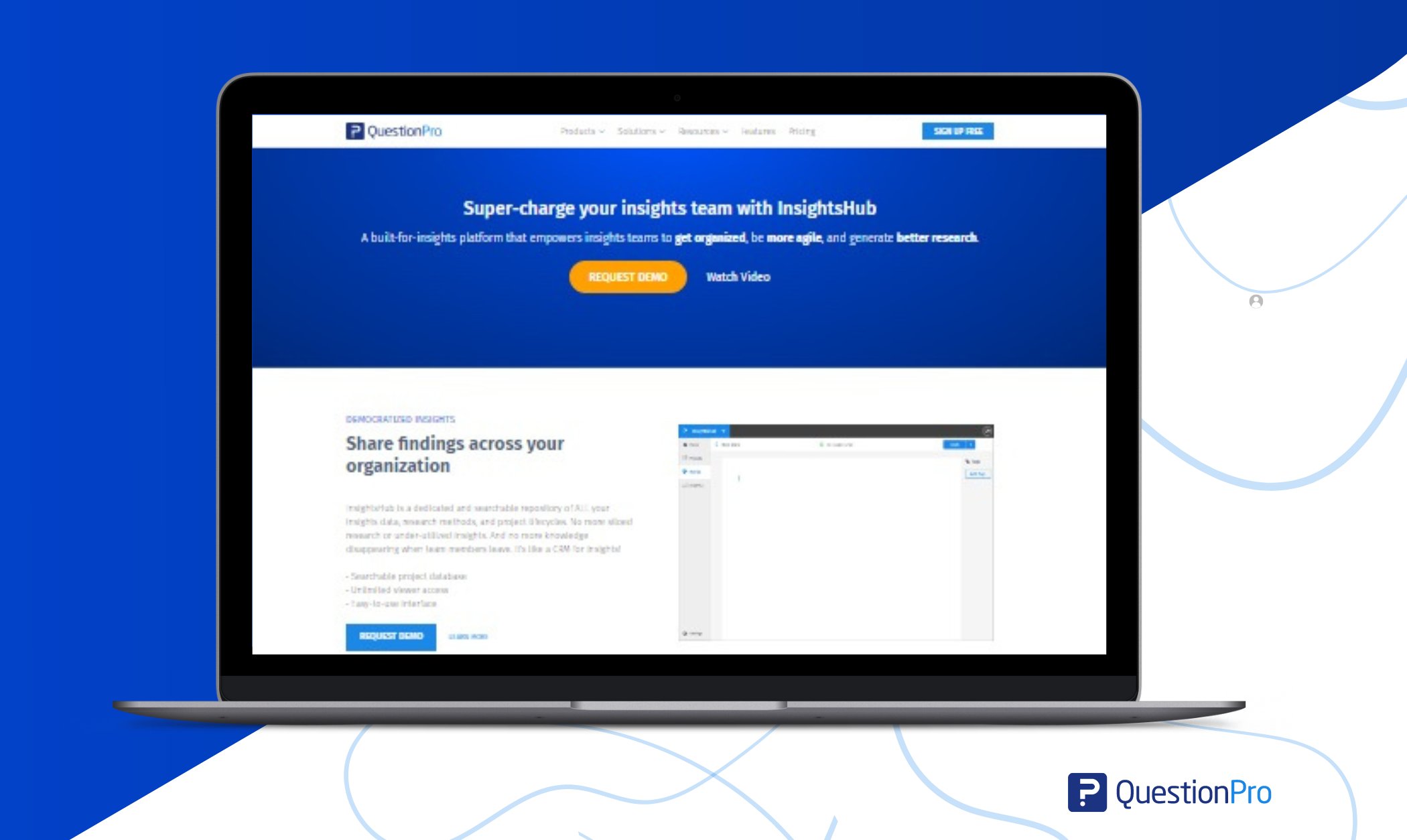
InsightHub is a specialized platform designed to empower insights teams by centralizing and organizing insights data, research methodologies, and project lifecycles.
It offers a searchable repository for all insights-related information, ensuring no knowledge is lost when team members change. The platform supports project management with features for updating project statuses, monitoring knowledge management team activities, and customizing workflows. InsightHub facilitates:
- Cross-project analysis through smart tagging.
- Deep search.
- Knowledge graphing.
This allows teams to uncover meta-themes and cross-project trends, enhancing the depth and breadth of research insights.
It integrates seamlessly with existing research ecosystems and technology stacks, supports over 50 languages, and ensures compliance with GDPR, HIPAA, and other regulatory standards.
02. Confluence
Developed by Atlassian, Confluence is a team collaboration software that allows for the creation, sharing, and organization of knowledge within teams. It features a wiki-style interface for documenting and discussing projects, processes, and ideas.
03. Slack
While primarily a messaging app, Slack also serves as a knowledge-sharing platform through channels, integrations with other tools, and the ability to search and access past conversations and shared files.
04. Bloomfire
Bloomfire is one of the knowledge management tools that facilitates the creation, sharing, and management of knowledge assets such as documents, videos, and discussions. It includes features for content categorization, search, and analytics.
05. Zendesk Guide
Zendesk Guide is a knowledge-based software that helps businesses create and manage customer-facing support content. It includes features for building help centers and community forums and integrating with customer support workflows.
Features of Knowledge Management System
A Knowledge Management System (KMS) facilitates the creation, organization, sharing, and utilization of knowledge within an organization. Here are some key features typically found in a KMS:
1. Content Creation and Capture
This feature enables users to create, edit, and upload various types of content, such as documents, presentations, videos, and images. It ensures that knowledge is captured in a structured manner.
2. Knowledge Repository
Serves as a centralized repository for storing and organizing knowledge assets. This repository can include documents, articles, best practices, FAQs, case studies, and other forms of knowledge.
3. Search and Retrieval
Provide robust search capabilities to help users quickly find relevant information within the knowledge repository. Advanced search functionalities, such as filters and metadata tagging, enhance the accuracy and efficiency of information retrieval.
4. Collaboration Tools
Facilitate collaboration among users by enabling them to share knowledge, discuss ideas, and collaborate on projects within the system. Features like commenting, version control and real-time editing enhance collaboration and knowledge sharing.
5. Knowledge Sharing and Distribution
Enable users to easily share knowledge with others in the organization through various channels, including email, messaging, and social collaboration platforms. Integration with communication tools promotes seamless knowledge sharing.
6. Knowledge Capture from Experts
Provide mechanisms for capturing tacit knowledge from subject matter experts through interviews, discussions, or knowledge-sharing sessions. This ensures that valuable expertise is documented and made accessible to others.
7. Knowledge Organization and Categorization
Users can categorize and tag knowledge assets based on topics, keywords, or other relevant attributes. A clear organization makes it easier to find and access important information.
8. Access Control and Security
Implement robust access control mechanisms to ensure that sensitive information is protected and only accessible to authorized users. Role-based access control (RBAC) and encryption help safeguard confidential knowledge assets.
9. Analytics and Reporting
Analytics and reporting features provide insights into knowledge usage, user engagement, and content effectiveness. This enables organizations to measure the impact of their knowledge management initiatives and make informed decisions.
10. Integration with Existing Systems
Integrate with other enterprise systems such as document management, customer relationship management (CRM), and learning management systems (LMS) to ensure seamless access to knowledge across the organization.
Types of Knowledge Management System
Knowledge Management Systems (KMS) can be categorized into several types based on their primary functions and purposes within organizations. Here are some common types:
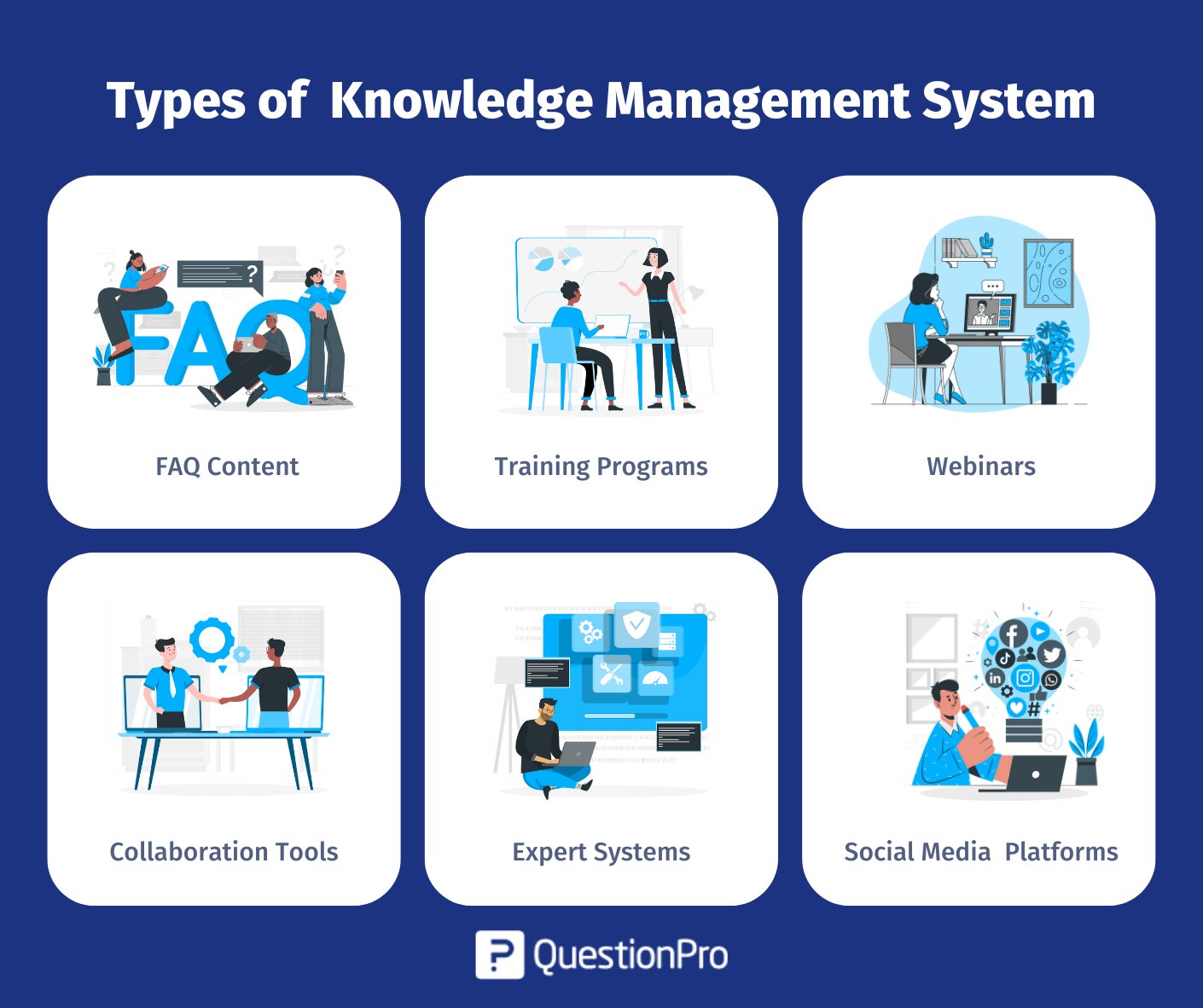
1. FAQ Content
FAQ sections provide quick answers to common questions, often seen on websites for customer support or internal portals for employees. They save time by providing instant answers, reduce repetitive support inquiries, and improve user satisfaction.
2. Education Training Programs
Structured learning platforms offering courses and training programs, including online academies, workshops, and e-learning modules. It supports:
- Continuous learning and professional development.
- Ensures consistent training across the organization.
- Enhances employee skills and knowledge.
3. Webinars
Online seminars or presentations that provide information, training, or updates on specific topics. They can be live or recorded for later viewing. It offers:
- A convenient way to disseminate knowledge.
- Allows for interaction and Q&A sessions.
- Can reach a large audience simultaneously.
4. Collaboration Tools
Tools like intranets, wikis, and chat platforms facilitate communication and collaboration among team members, allowing them to share knowledge and work together more effectively.
This type of KM system enhances teamwork and knowledge sharing, supports remote and hybrid work environments, and improves project coordination and efficiency.
5. Expert Systems
Systems that use artificial intelligence (AI) to simulate human expertise and provide solutions to complex problems are often used in fields like medicine, engineering, and finance.
- Offers advanced problem-solving capabilities,
- Reduces dependency on human experts, and
- Improves decision-making accuracy.
6. Social Media and Networking Platforms
Platforms that enable informal knowledge sharing and networking among employees, such as enterprise social networks or professional networking sites. This system encourages spontaneous knowledge exchange, builds professional connections, and promotes a culture of collaboration and innovation.
Benefits of Knowledge Management System
The better a business does, the more effectively and efficiently it shares information with its employees.
Companies do not usually consider these types of tools, but incorporating them can bring many advantages that will make your processes and your company more effective. Below, we share some of the most important advantages and a brief explanation so that you can convince yourself of the difference these systems can have in your company.
- Quicker decision-making: When employees have easy access to relevant information and knowledge, they can make decisions more swiftly as they are better informed.
- Adequate access to knowledge and information: Knowledge Management Systems ensure that employees can access the information they need when needed. It reduces time wasted searching for information and improves overall productivity.
- Collaboration and idea generation have improved: Knowledge management systems promote collaboration and creativity within the organization by facilitating the sharing of knowledge and ideas among employees. It leads to innovation and enhanced problem-solving.
- Improved communication throughout your organization: Effective knowledge management fosters better communication channels, which ensures that information flows smoothly between different departments and levels of hierarchy.
- Better quality of information and data: Knowledge Management Systems help maintain the quality and accuracy of information by providing mechanisms for verification, validation, and updating of knowledge repositories.
- More safety for intellectual property: By centralizing and controlling access to sensitive information and intellectual property, Knowledge Management Systems help protect valuable assets from unauthorized use or disclosure.
- Optimized training: Knowledge Management Systems can store and disseminate training materials. It makes it easier to onboard new employees, train existing staff, and ensure everyone can access the latest knowledge and best practices.
Difference Between Knowledge Management and Knowledge Management System
Implementing a good Knowledge Management System enhances customer satisfaction by ensuring timely access to accurate information and expertise. Here’s a table outlining the main differences between Knowledge Management (KM) and Knowledge Management System (KMS):
| Knowledge Management | Knowledge Management System |
| The process of capturing, storing, sharing, and utilizing knowledge within an organization. | The technological infrastructure or platform facilitates knowledge management within an organization. |
| Focuses on the overall strategy, culture, and processes related to knowledge within an organization. | Focuses on the tools, software, and systems used to support knowledge management efforts. |
| Encompasses both tacit (personal knowledge) and explicit (codified knowledge) within an organization. | Primarily deals with organizing, categorizing, storing, retrieving, and disseminating explicit knowledge. |
| It is more holistic and encompasses cultural, behavioral, and process-related aspects. | More technical and focuses on the implementation and operation of software and systems. |
| Enhance collaboration, innovation, decision-making, and organizational learning. | Improve information accessibility, knowledge sharing, and efficiency in knowledge-related tasks. |
| Establishing communities of practice, conducting lessons-learned sessions, and developing knowledge-sharing cultures. | Implementing document management systems, creating intranet portals, and deploying expert systems. |
Best Practices to Implement Knowledge Management System
Implementing a Knowledge Management System (KMS) involves various steps and considerations to ensure effectiveness. Here are some best practices to guide you through the process:
- Define Objectives and Scope: Clearly outline the goals and objectives of your Knowledge Management System and define the scope of your KMS.
- Involve Stakeholders: Engage key organizational stakeholders, including employees, managers, and experts.
- Choose the Right Technology: Select a KMS platform or knowledge management software that aligns with your organization’s needs, size, and IT infrastructure.
- Capture and Organize Knowledge: Develop a systematic approach for capturing, organizing, and categorizing knowledge assets. Establish metadata standards and tagging conventions to ensure consistency and ease of retrieval.
- Promote Knowledge Sharing Culture: Create a culture of knowledge sharing within the organization and encourage employees to contribute their expertise and collaborate on projects through forums, wikis, and social platforms.
- Provide Training and Support: Offer ongoing training sessions to help users understand how to use the KMS effectively.
- Ensure Data Security and Compliance: Implement robust security measures to protect sensitive information and ensure compliance with data privacy regulations.
- Monitor and Measure Performance: Establish key performance indicators (KPIs) to evaluate the effectiveness of your KMS. Track metrics such as user engagement, content creation, knowledge reuse, and impact on productivity.
How Can QuestionPro InsightHub Help as a Knowledge Management System?
QuestionPro InsightHub can play a valuable role as a good knowledge management software by offering several features and functionalities that support knowledge sharing, collaboration, and retention within an organization.
Here are some ways in which QuestionPro InsightHub can contribute to knowledge management:

01. Surveys and Polls
InsightHub allows users to create surveys and polls to gather insights and feedback from employees or stakeholders. This data can be used to identify knowledge gaps, assess training needs, or gather opinions on specific topics relevant to knowledge management.
02. Discussion Forums
InsightHub provides a platform for hosting discussion forums where employees can ask questions, share expertise, and exchange knowledge. These forums facilitate informal learning and help capture tacit knowledge within the organization.
03. Content Sharing
InsightHub enables users to share documents, articles, and other resources related to knowledge management. This feature allows employees to access relevant information easily and promotes continuous learning and development.
04. Data Analysis
InsightHub offers robust data analysis capabilities, including advanced analytics and reporting tools. Organizations can use these features to identify trends, patterns, and insights within the data collected, enabling informed decision-making and strategic knowledge management initiatives.
05. Collaboration Tools
InsightHub includes collaboration tools such as team workspaces, project management features, and real-time chat, which facilitate collaboration among employees working on knowledge management projects or initiatives.
06. Feedback Mechanisms
InsightHub allows organizations to gather employee feedback on knowledge management processes, tools, and initiatives. This feedback can be used to improve the effectiveness and relevance of the Knowledge Management System over time.
07. Integration Capabilities
InsightHub can be integrated with other systems and tools used within the organization, such as learning management systems (LMS), customer relationship management (CRM) software, or enterprise resource planning (ERP) systems. This integration ensures strong data flow and enhances the knowledge management system’s overall effectiveness.
Conclusion
A Knowledge Management System is a powerful tool that can transform the way an organization manages and utilizes its knowledge assets. By improving decision-making, enhancing collaboration, increasing efficiency, and promoting continuous learning, a KMS can provide a significant competitive advantage.
If you haven’t already, consider exploring the different types of Knowledge Management Systems to find the one that best suits your needs. The benefits are clear, and the right KMS can make a world of difference in achieving your organizational goals.
By exploring the features and functionalities of QuestionPro InsightHub, organizations can create a robust Knowledge Management System that promotes knowledge sharing, collaboration, and continuous learning across the organization. Contact QuestionPro today to learn more about it.
Frequently Asked Questions (FAQ)
Knowledge Management helps organizations improve decision-making, innovate more effectively, and enhance productivity by leveraging internal knowledge and expertise.
It facilitates capturing and sharing of best practices, lessons learned, and expertise, creating a culture of continuous learning and improvement.
Challenges may include resistance to change, difficulty in knowledge capture and classification, maintaining data quality, and ensuring user adoption and engagement.






